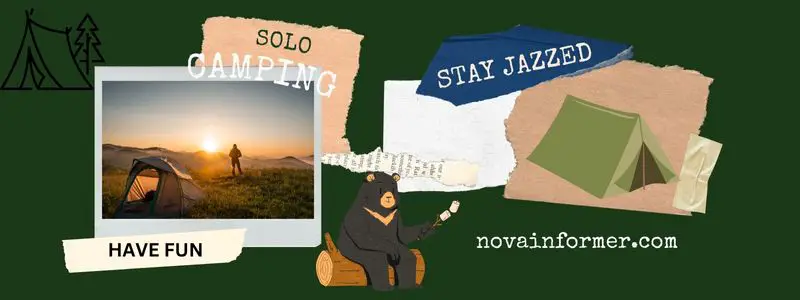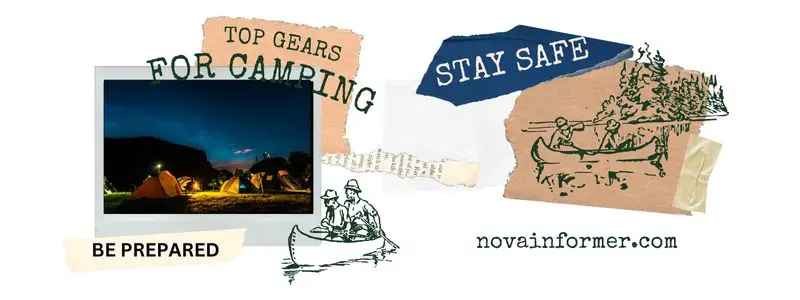Embark on a solo camping adventure and reconnect with nature. 🏕️ Discover tips, gear, and unforgettable experiences in the wilderness. #SoloCamping101
Hey there, fellow nature lovers and adventure seekers. Welcome to Solo Camping 101 – your ultimate guide to experiencing the great outdoors all by yourself.
In this article, we’ll delve into the exciting world of solo camping and share tips, tricks, and stories to make your wilderness journey a roaring success.
Solo camping is not just about seeking solitude; it’s a chance to reconnect with nature, challenge yourself, and create unforgettable memories. Whether you’re an experienced camper looking to try something new or a complete newbie eager to embark on your first solo adventure, we’ve got you covered.
Before we embark on this magical journey, see what we will be touching on;
Table of Contents
- Benefits of Solo Camping
- Essential Gear for Solo Camping
- Choosing the Perfect Campsite
- Campfire Cooking Tips and Food
- Staying Safe and Surviving the Wild
- Embracing the Solitude and Disconnecting
- Wildlife Encounters: Friend or Foe?
- Tips for a Memorable Night Sky Experience
- Solo Camping Etiquette and Leave No Trace Principles
- Frequently Asked Questions (FAQ)
- Conclusion: Embrace the Wilderness.
Now grab your backpack, leave behind the noise of the city, and let’s venture into the heart of the wilderness.
Benefits of Solo Camping
Solo camping offers an unparalleled sense of freedom and self-discovery. Unlike camping with friends or family, you have the liberty to set your own pace, choose your route, and make spontaneous decisions.
It’s an opportunity to break free from the hustle and bustle of everyday life and immerse yourself in the beauty of Mother Nature.
Increased Self-Reliance: When you’re out there alone, you become your own hero. You’ll learn to rely on yourself, build confidence in your abilities, and tackle challenges head-on.
Deep Connection with Nature: Without distractions, you can truly absorb the sights, sounds, and smells of the wilderness. Witnessing breathtaking sunrises and starry night skies becomes an everyday delight.
Personal Growth and Reflection: The solitude provides a perfect setting for self-reflection. As you disconnect from the digital world, you’ll find the space to ponder life’s questions and gain valuable insights.
Disconnect to Reconnect: Unplugging from technology can be incredibly liberating. Instead of staring at screens, you’ll focus on the beauty around you and engage in meaningful activities.
Increased Awareness: Solo camping sharpens your senses. You’ll notice the subtle changes in weather, animal behavior, and the environment, becoming more attuned to the world around you.
Discover the joy of unplugging from the digital world and embracing the serenity of the wilderness. Remember, even in solitude, you’re never alone when nature embraces you.
Essential Gear for Solo Camping
Packing the right gear is essential for a smooth solo camping experience. Before you head out, let’s go through the must-haves to ensure you’re well-prepared for the adventure ahead.
Tent:
Invest in a reliable, lightweight, and easy-to-set-up tent that can accommodate you comfortably. Consider a single-person tent for minimum impact and maximum mobility.
Sleeping Bag and Pad:
A cozy sleeping bag and a comfortable sleeping pad are essential for a good night’s rest in the wilderness. Look for ones suitable for the expected weather conditions.
Backpack:
Choose a sturdy backpack with proper support to carry all your essentials without straining your back.
Multi-Tool or Knife:
A multi-tool or a good-quality camping knife is your Swiss Army companion in the wild. It will come in handy for various tasks, from cutting food to repairing gear.
Cooking Gear:
A portable camping stove, cooking utensils, and a mess kit are essential for preparing delicious meals at your campsite.
Water Filtration System:
Access to clean water is vital for your survival. Invest in a reliable water filtration system or purification tablets.
First Aid Kit:
Accidents can happen, so always carry a well-stocked first aid kit and know how to use it.
Navigational Tools: A map, compass, or GPS device will help you navigate your way through unfamiliar terrain.
Flashlight or Headlamp: A reliable source of light is a must for nighttime activities and emergencies.
Weather-Appropriate Clothing: Dress in layers to adapt to changing weather conditions. Include waterproof and windproof gear.
Food and Snacks: Pack lightweight, non-perishable food items that are easy to prepare and nutritious.
Personal Items: Don’t forget essentials like sunscreen, insect repellent, toiletries, and a small towel.
Emergency Whistle: A whistle can be a lifesaver in case of an emergency, alerting others to your location.
Ensure you’re well-prepared for your solo adventure with these essential camping gears.
Choosing the Perfect Campsite
Finding the ideal campsite is an art. While some campers prefer seclusion in remote areas, others may enjoy the company of fellow nature enthusiasts at established campgrounds.
Whatever your preference, a well-chosen campsite can make or break your camping adventure.
Consider Your Skill Level: If you’re new to solo camping or camping in general, start with well-traveled campsites that offer facilities and safety.
Research the Location: Familiarize yourself with the area by reading online reviews, talking to experienced campers, and checking out camping forums.
Accessibility and Distance: Decide how far you’re willing to hike or travel to reach your campsite. Consider your physical abilities and the weight of your backpack.
Scenic Views and Natural Protection: Look for campsites with breathtaking views and natural protection from elements like wind and rain.
Regulations and Permits: Be aware of any camping regulations, permits, or restrictions in the area you plan to camp.
Leave No Trace: Choose established campsites to minimize your impact on the environment. Leave nature as you found it, or even better.
Explore hidden gems in national parks and remote locations that offer solitude and tranquility like nowhere else. Get ready to wake up to stunning landscapes right outside your tent.
Campfire Cooking Tips and Food
Who said camping food has to be boring? One of the joys of solo camping is cooking delicious meals over a campfire. It’s an adventure in itself.
Here are some tips and easy-to-make recipes to tantalize your taste buds:
Campfire Cooking Tips:
- Safety First: Build your campfire in a designated fire pit, away from flammable materials and overhanging branches.
- Fuel and Flame Control: Use dry firewood and kindling to start the fire. Control the flame intensity by adjusting the size of the firewood.
- Cooking Equipment: Invest in a sturdy cooking grate or a tripod for hanging pots and pans over the fire.
- One-Pot Wonders: Embrace one-pot meals to minimize cleanup and simplify cooking.
- Prep Work at Home: Chop vegetables, marinate meat, and prepare spices at home to save time at the campsite.
Campfire Food
1. Campfire Chili:
A hearty and comforting meal to keep you warm on chilly nights. Prepare your favorite chili recipe at home, pack it in a sealable bag, and reheat it over the campfire.
2. Foil Packet Delights:
Wrap seasoned chicken or fish, along with veggies, in aluminum foil packets. Cook them directly on the campfire for a flavorful and mess-free meal.
3. S’mores Galore:
No camping trip is complete without s’mores. Toast marshmallows over the fire and sandwich them between graham crackers and chocolate for a sweet treat.
4. Campfire Pizza:
Prepare mini pizza crusts at home and bring your favorite toppings. Assemble your pizzas at the campsite and cook them on a campfire grill or pan.
5. Banana Boat Dessert:
Slice a banana lengthwise, stuff it with chocolate chips and marshmallows, wrap it in foil, and let it melt over the campfire for a gooey dessert.
Ready to become a campfire gourmet chef? Explore the magic of campfire cooking and unleash your culinary creativity in the wilderness.
Staying Safe and Surviving the Wild
Safety first, adventurers. While solo camping can be incredibly rewarding, it also comes with its set of challenges. Preparation and knowledge are the keys to staying safe and thriving in the wild.
Here are some essential tips:
Inform Someone: Before you head into the wilderness, share your camping plans and itinerary with a friend or family member. Let them know when you expect to return.
Study the Area: Familiarize yourself with the terrain, weather patterns, and any potential hazards of the area you’ll be exploring.
Emergency Communication: Carry a fully charged cell phone, a power bank, and a portable charger to ensure you can communicate in case of emergencies.
Navigation Skills: Brush up on your map reading and navigation skills. Always carry a map and compass, even if you rely on GPS.
Water Sources: Identify nearby water sources, but always have a backup plan in case they are inaccessible or contaminated.
Wildlife Awareness: Research the types of wildlife you may encounter and learn how to react appropriately if you encounter them.
Campfire Safety: Follow the principles of Leave No Trace and ensure your campfire is fully extinguished before leaving the site or going to sleep.
Weather Preparedness: Keep an eye on weather forecasts and be prepared for changing weather conditions. Carry appropriate clothing and gear.
Trust Your Instincts: If something doesn’t feel right, trust your instincts and make safe decisions.
Master the art of navigating through the wilderness and overcoming challenges like a seasoned explorer. Remember, preparation is the key to surviving and thriving in the wild.
Embracing the Solitude and Disconnecting
In a world filled with constant noise and distractions, solo camping provides a rare opportunity to disconnect from technology and embrace the serenity of nature.
Use this time to rekindle your relationship with yourself and the world around you.
Practice Mindfulness: Engage in mindfulness activities like meditation, yoga, or simply sitting in silence, observing the sounds of nature.
Write and Reflect: Keep a journal to jot down your thoughts, experiences, and reflections during your solo adventure.
Unplug from Technology: Resist the urge to check your phone or social media constantly. This time is about connecting with nature, not the virtual world.
Read and Reconnect: Bring along a good book or some poetry to read under the shade of a tree or by the campfire.
Photography and Creativity: If you enjoy photography, capture the beauty of nature through your lens. Get creative and let the surroundings inspire you.
Disconnect to reconnect with yourself and the world around you. Embrace the solitude and let nature work its magic on your soul.
Wildlife Encounters: Friend or Foe?
Meeting wildlife in their natural habitat can be exhilarating and nerve-wracking at the same time. While most encounters are awe-inspiring, it’s essential to know how to coexist with animals respectfully and safely.
Research Wildlife Habits: Before your trip, research the wildlife in the area and learn about their behavior. This knowledge will help you react appropriately in different situations.
Keep a Safe Distance: Admire wildlife from a safe distance and avoid getting too close to avoid startling or threatening them.
Proper Food Storage: Store your food securely, away from your sleeping area, to prevent attracting unwanted visitors to your campsite.
Make Noise: When hiking or walking, make some noise to alert animals of your presence. Most animals prefer to avoid humans if they hear them coming.
Bear Safety: If camping in bear country, carry bear spray, learn how to use it, and know how to respond if you encounter a bear.
Photograph Respectfully: If you take pictures of wildlife, use a zoom lens to maintain a safe distance and avoid causing stress to the animals.
Share your wildest wildlife encounters in the comments below and let’s hear some entertaining stories. Remember, respecting wildlife is key to harmonious coexistence.
Tips for a Memorable Night Sky Experience
Stargazing while camping is a breathtaking experience that connects you with the universe on a profound level. In the wilderness, far from city lights, the night sky comes alive with twinkling stars and celestial wonders. Here are some tips for an unforgettable night sky adventure:
Plan Your Timing: Check moonrise and moonset times to choose the best nights for stargazing. A new moon or crescent moon phase provides the darkest skies.
Avoid Light Pollution: Choose a campsite away from city lights to enjoy a clearer view of the stars.
Bring Binoculars or a Telescope: Enhance your stargazing experience by bringing binoculars or a telescope to observe planets, star clusters, and even distant galaxies.
Learn the Constellations: Familiarize yourself with the major constellations and use stargazing apps to identify stars and planets.
Capture the Night Sky: If you have a camera with manual settings, try your hand at astrophotography to capture the beauty of the night sky.
Embrace Silence: Sit or lie down comfortably and let the silence envelop you as you gaze at the stars. Allow yourself to feel small and connected to the vastness of the universe.
Discover the magic of the night sky, where stars become your companions, and the universe unfolds its mysteries before your eyes.
Solo Camping Etiquette and Leave No Trace Principles
As a responsible solo camper, it’s essential to follow etiquette guidelines and Leave No Trace principles to preserve the wilderness for future generations.
Campsite Selection: Choose established campsites when possible to minimize your impact on the environment.
Campfire Practices: Use designated fire pits or stoves for cooking, and ensure your campfire is fully extinguished before leaving the area.
Pack Out Trash: Always carry out all trash, including food scraps and biodegradable waste.
Respect Wildlife: Admire wildlife from a distance and avoid feeding or approaching animals.
Stay on Trails: Stick to designated trails to minimize trampling on vegetation and disturbing wildlife.
Minimize Noise: Keep noise levels low to avoid disrupting wildlife and fellow campers.
Share the Trail: Be courteous to other hikers and campers, yield the trail when appropriate, and offer a friendly greeting.
Let’s unite as responsible campers and preserve the beauty of our beloved wilderness. Leave no trace and leave only foot.
prints of respect and appreciation.
Frequently Asked Questions (FAQ)
Q: Is solo camping safe for beginners?
A: It is. Start with well-traveled campsites and plan thoroughly. Familiarize yourself with the area and share your trip details with a friend or family member.
Q: How can I overcome the fear of camping alone?
Take baby steps. Practice backyard camping or camp near your vehicle initially. Gradually build up your confidence and skills.
Q: Can I bring my furry friend along?
Of course. Many campsites are pet-friendly, but always check the rules and keep your pet on a leash.
Q: What if I encounter bad weather during my trip?
Stay informed about weather forecasts and be prepared with appropriate gear. Flexibility in your plans is key.
Q: Are campfires allowed everywhere?
Not always. Check the regulations of your chosen campsite and use designated fire pits if available.
Q: How do I deal with loneliness during solo camping?
Embrace the solitude and use the time for self-reflection and relaxation. Bring a book, write in a journal, or take up a new hobby.
Q: What should I do if I encounter wild animals?
Stay calm, make yourself look bigger, and make loud noises. In most cases, animals will keep their distance.
Q: Can I camp in the winter?
Yes, winter camping can be magical. However, it requires extra preparation and specialized gear.
Q: What are some must-have gadgets for solo camping?
A portable camping stove, a water purification system, and a reliable GPS device are handy gadgets to carry.
Q: How do I ensure I leave no trace of my campsite?
Follow the Leave No Trace principles: pack out all trash, minimize campfire impact, and respect wildlife and other campers.
Q: What’s the best way to make friends while solo camping?
Be friendly and approachable. Engage in conversations with fellow campers and participate in group activities if available.
Conclusion: Embrace the Wilderness
Congratulations, brave souls. You are now equipped with the knowledge and inspiration to venture into the wild alone.
Solo camping is not just an adventure; it’s a journey of self-discovery and a chance to create unforgettable memories. So, pack your bags, leave the worries behind, and embrace the wilderness with open arms.
Happy camping.
“In the wilderness, I sense the miracle of life, and behind it, our scientific accomplishments fade to trivia.” – Charles A. Lindbergh
If this guide helped you, please share with people you care about. It will definitely help them too.



